Lying down and learning: on strings, lying on one's side and self-discovery

In this blog about the DLR-NASA bed rest study, the 'Sensorimotor Countermeasures Study (SMC)', we report on the lives of participants and the work of the large team around them, as well as what it means to be part of such a major study.
Today we hear from a participant who has been in bed, tilted at a six-degree angle towards the head, for 32 days. What is daily life like in bed? What experiments take place? What are the biggest challenges? How do you organise your time? And how do you actually keep yourself occupied? Here, she reports on a day in the life of a bed-rest participant and her very personal experiences on this mission as a terrestrial astronaut.
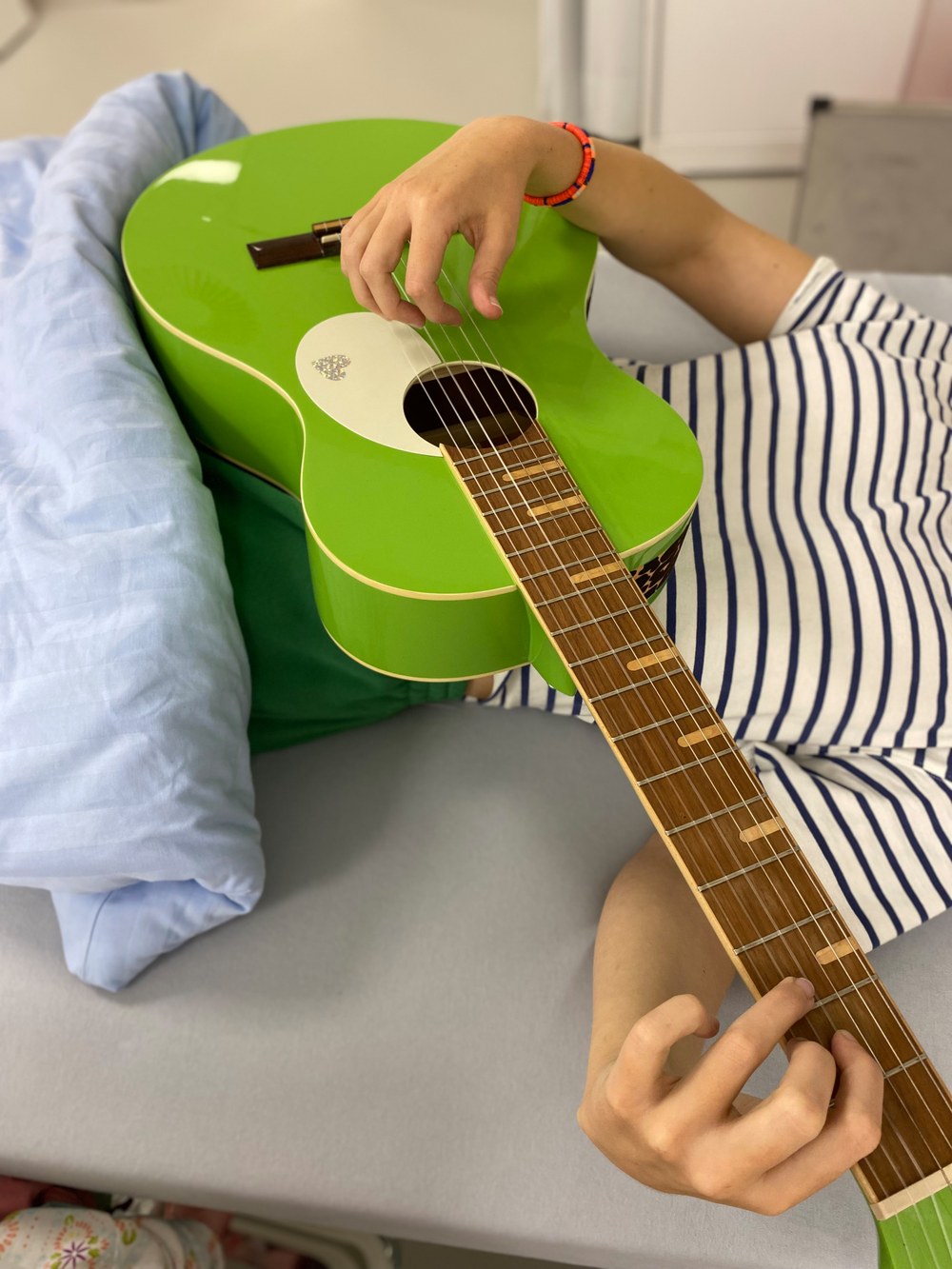
'If I lay here... If I just lay here... would you lay with me and just forget the world?' I practice the chords to these lyrics daily, but more than ten to fifteen minutes at a time is difficult because my wrist quickly cramps in this position. Learning to play the guitar while lying down at a six-degree tilt towards the head is a self-imposed challenge. Raising my head to see the strings? Strictly forbidden! I reach blindly, often missing them. It's like Twister for the fingers, only no one is laughing except for me. Progress is very slow, but I have time... lots of time. Almost as much time as an astronaut on a trip to Mars – except my mission is mainly to avoid falling out of bed.
Actually, this whole trip is a self-imposed challenge. I have been asked several times whether participating in this study is as I had imagined: Is it hard? What do you do all day? Don't you have back pain? How do you shower? And... use the toilet? What about muscle loss? No fresh air for three months? Away from society?
Three months for the NASA bed-rest study at DLR's :envihab, 60 days of which are spent lying down. I found it difficult to really imagine it beforehand. Instead of clear images in my head, I mostly had butterflies in my stomach – a curious anticipation of this extraordinary experience. Today is my thirty-second day in bed and I have a smile on my face. Thank you, gut feeling!
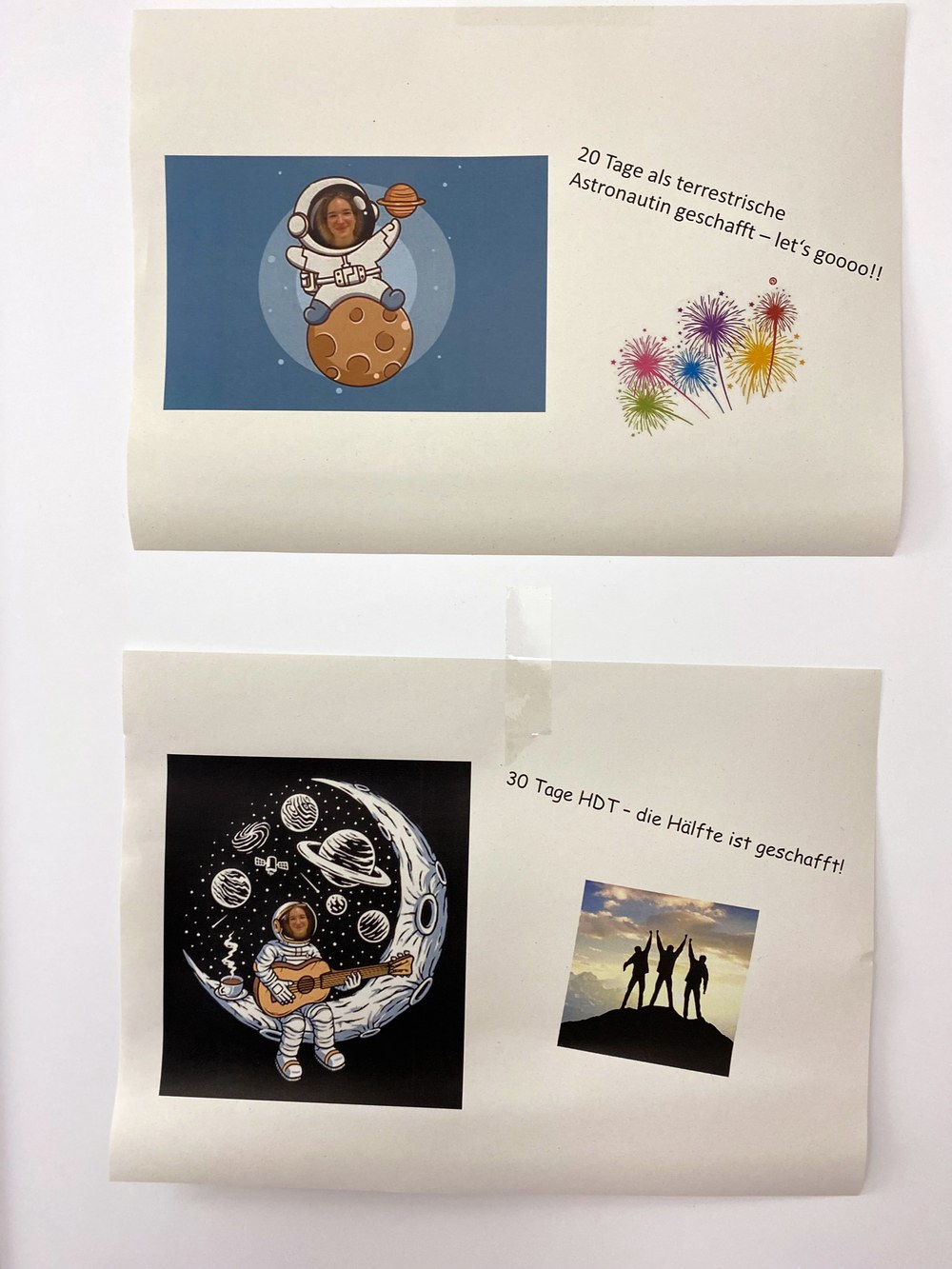
This experience is a very special one. When lying down, every mundane everyday activity suddenly becomes an exciting affair. Eating while lying on your side, with your non-dominant hand? A learning process begins. Brushing your teeth? Only by regularly switching hands and taking breathing breaks. Muscles you probably won't even find in an astronaut's training plan get used here. Combing your hair? It could almost be described as a sport. I envy my short-haired fellow participants. Taking a shower? It's an interesting feeling when water flows 'high' from the feet down to the head (including a free nasal shower). Everything is familiar and new at the same time. Different. I find it exciting. Both strange and familiar. Experiencing things you've done countless times in your life in a new way. Automated behaviour is deconstructed, the unconscious becomes conscious again. The joy of a toddler at every successful adaptation.
There are precious moments of absolute independence. With a half-elegant jerk, I turn towards the wardrobe and push its door aside with my beloved 80-centimetre-long plastic grabber. I feel like MacGyver in horizontal mode, skilfully reaching for a fresh T-shirt. A sense of achievement! There isn't much you can do here all by yourself, so every spark of independence is a reason to cheer. That doesn't mean I don't also enjoy calling the study office. There's at least one person sitting there 24 hours a day to answer our calls and monitor eleven small screens to make sure we're all spending our days safe and sound in a slanted position.
I slide over to the other side of the bed like a seal, reach for the intercom and dial zero. It toots twice, and someone says "Jaa?" You can hear that they're smiling. "I need a urine bottle." "Sure, we'll bring it to you!" Needing help to do the most mundane things is a lesson in humility. I am healthy. I am lying here and experiencing all of this because I want to, not because I have to. Of course, no patient here is looking forward to ordering bedpans, filling them and having them collected. But it's all part of it. It brings you into contact with your own sense of shame, and that too is a valuable experience. The team that looks after us terrestrial astronauts day and night does everything to make it as pleasant as possible.
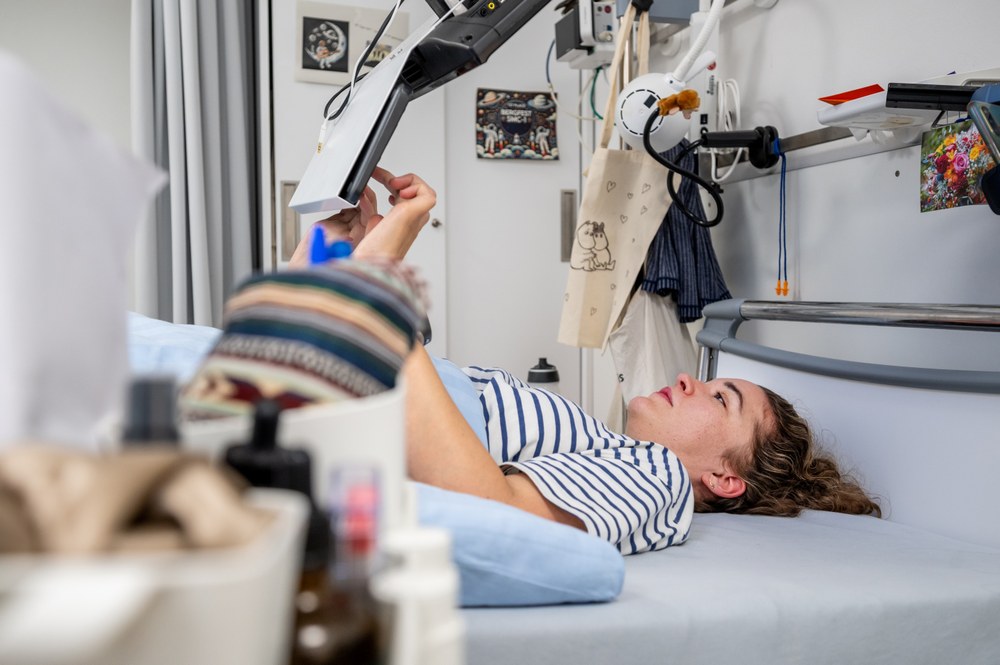
There is a knock at the door. A member of the DLR study team enters and places the urine bottle next to the bed. "How are you today?" We chat. She tells me what autumn is up to outside, and my mind fills with colourful images of rustling leaves and morning fog rolling across the field. Then, she leaves, closing the curtain and door behind her.
Once the door is closed, it is completely silent – only the air conditioning hums softly. At the start of the bed rest period, our focus was mainly on the changing perception of the body and new sequences of movements to be learned, but at halftime, the focus is increasingly on one's inner world. Lying around for a long time is a great way to get things straight. It makes no sense to resist the fact that at some point, big, philosophical and yet very specific, real-life questions are haunting your mind, even six degrees deeper.
Suddenly, I find myself asking questions like: What do I actually want to do with my life? How am I really doing? Did I truly understand every season of my favourite show or should I start over again? Last year was packed and wild. Now, it's time to reflect. Time to just be. Hit the pause button. In the middle of and at the same time far away from my own life. It's good for me. My calf muscles are weakening, yet inner clarity is strengthening. There's a knock at the door. I see the smiling face of a DLR employee. He's here to pick up my urine bottle and has also brought me the next water bottle.
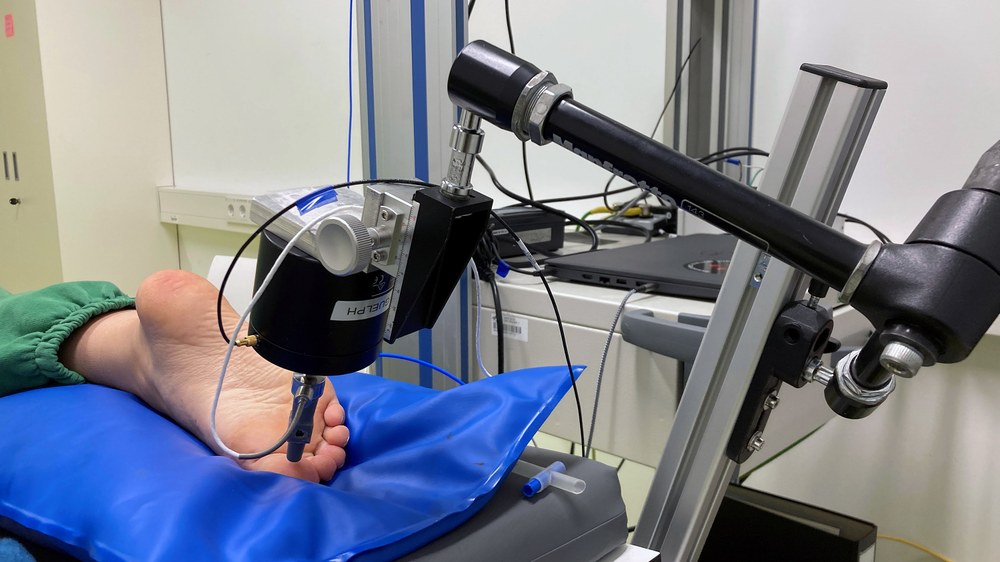
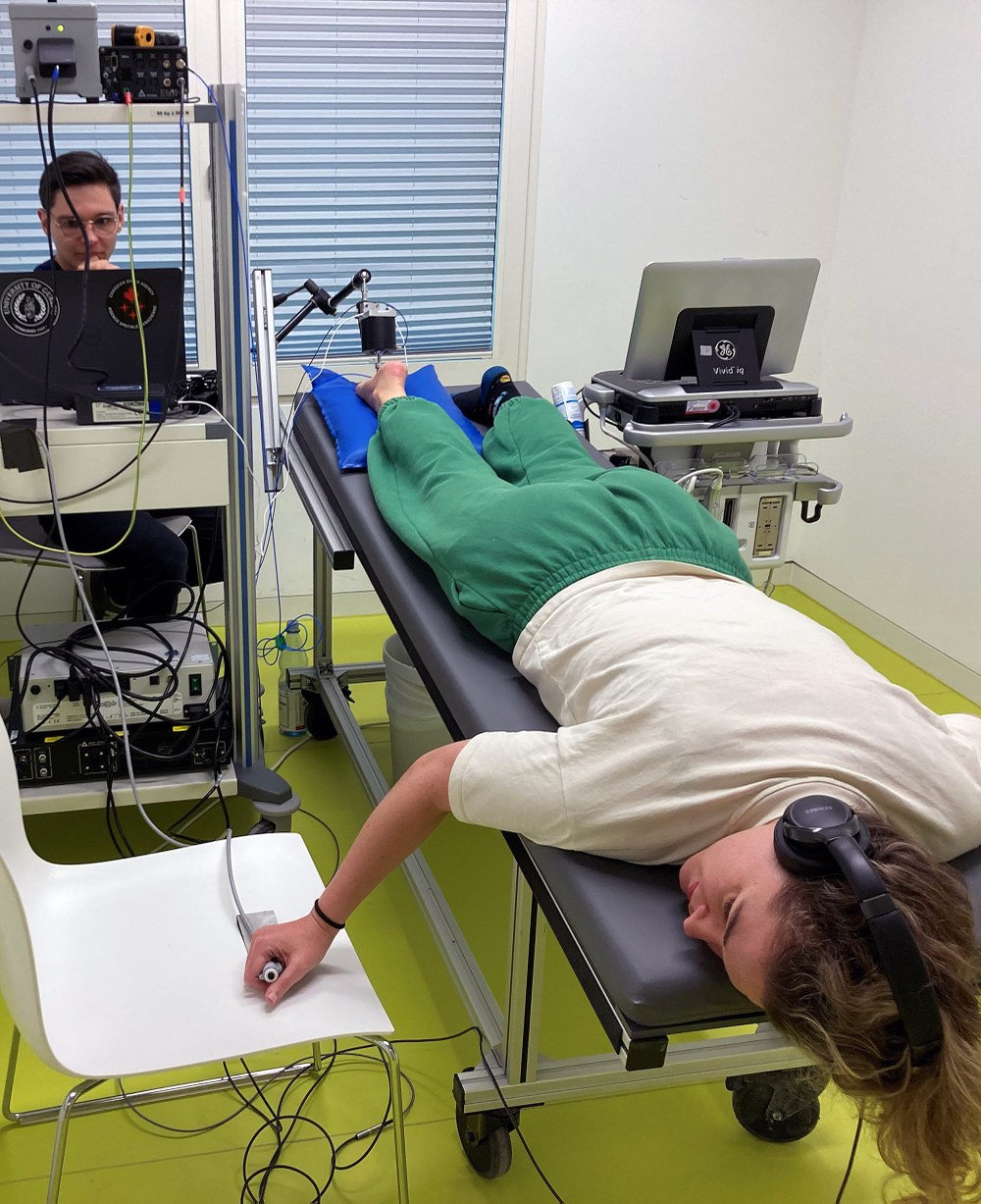
This morning, a sensory test for the soles of my feet is on the programme. I lie on my stomach on a couch and a device is placed on the sole of my foot, which emits different vibration patterns in succession to the toe, ball of the foot and heel – it tickles. A voice in my headphones says, "Descending". My job is to press a button when the vibration becomes too faint to feel. I focus all my attention on my big toe. The theory is that the sensitivity of the foot’s sole decreases over time during bed rest, as the pressure receptors there are barely stimulated. Lying at a six-degree head-down tilt also changes the distribution of fluids in the body, with less blood in the lower body and more in the upper body and head.
That's why our faces now look a little round and puffy, like astronauts after their return from microgravity. I affectionately call this my little moon face. Next comes the leg agility test. Lying down, I press my foot against a pedal that is attached to a kind of spring. If I press too hard, the spring moves and my leg wobbles uncontrollably back and forth. The goal is to hold the pedal steady with maximum force for about ten seconds without losing control of the spring. Today it is more difficult than it was at the start. My leg is shaking. But there's no need to worry – I find it fascinating to observe such changes in my own body. Every physical and psychological change is closely monitored here, and our health is the highest priority.
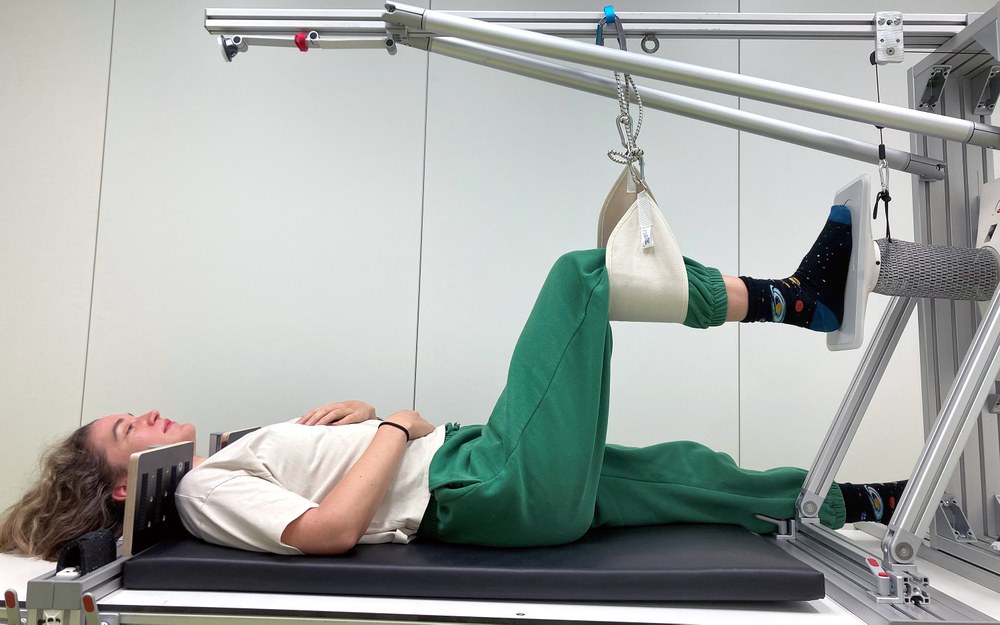
A glance at the watch on my wrist, which I wear day and night to record my activity levels and sleep cycles – it's 18:44, and dinner will be served in a quarter of an hour. The perfect time for a few études before the salad with sweet potato hearts and dried apricots that awaits me. I pick up my guitar and blindly play from A-major to E-major to D-major and back to A. Did Snow Patrol have a period of 60 days in mind when they wrote 'Chasing Cars', a song about lying around together? Probably not. I pick at the strings, feeling motivated. The chords hum lightly, and the E sounds a bit off. Maybe exactly six degrees off, I think, and sing softly to myself: 'If I lay here... if I just lay here…'
Related links
- Blog post – Milestone reached in the bed-rest study
- Blog post – After three weeks of bed rest: thumbs up for the nutrition team!
- Blog post – Taking a lie-down for science: New NASA bed-rest study begins in the :envihab at DLR
- Blog post – 400 kilometres apart and yet connected: My analogue mission with the crew on the ISS
- The aerospace medicine research facility :envihab
- DLR Institute of Aerospace Medicine
Tags:
